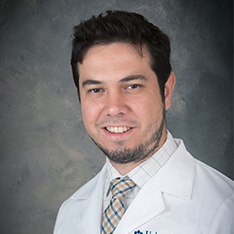Get exceptional treatment and services for diabetes and other endocrine disorders at the Texas Diabetes Institute in San Antonio. When you choose University Health for care, you’ll benefit from our expertise and reputation for maintaining A1C levels.
Complete Diabetes Treatment
Discover our comprehensive approach to your treatment at the Texas Diabetes Institute. Our approach is different because we treat all types of people with diabetes, all kinds of diabetes and all diabetes-related health complications.
Find help to:
- Detect diabetes early
- Manage diabetes
- Treat diabetes effectively to lessen its impacts
Superior, Convenient Diabetes Care
Access advanced diabetes treatments in San Antonio near your work or home. You’ll appreciate receiving care in a program without walls. That means we maintain the high care standards you expect while bringing our experts close to you.
Seek specialized diabetes and endocrinology care and treatment in University Health outpatient clinics, at the Dr. Robert L.M. Hilliard Center, and the Texas Diabetes Institute.
Partnering with Your Primary Care Doctor
Your endocrinologist will share your care plan with your primary care provider (PCP). Coordination of care with your PCP is essential to ensure you get the best treatment results.
A1C Management
Trust us to help you reach and maintain your A1C levels goal. The A1C blood test measures your average blood sugar level for two to three months. The result is a percentage and indicates how well you are controlling your blood sugar. No matter which type of diabetes you have, A1C levels are important to make sure your treatment plan is working.
Type 1 Diabetes Treatments
When you have type 1 diabetes, you have insulin dependency. Your diabetes treatment plan will focus on controlling your blood sugar level by:
- Taking the correct amount of insulin at the right time
- Checking your blood sugar regularly
- Eating a healthy diet, exercising and managing your weight
Managing Type 1 Diabetes
Rely on your endocrinologist to choose the type of insulin you take based on individual needs. Your certified diabetes educator at University Health and diabetes classes will help you learn to:
- Inject insulin and use an insulin pump based on your treatment plan
- Use a continuous glucose monitor if needed
- Take care of yourself and make lifestyle changes
Prediabetes Care
If you are diagnosed with prediabetes, you will establish ongoing care with your primary care provider (PCP) and see an endocrinologist as needed. If you require specialized support, ask your PCP for a referral with one of our endocrinologists at the Texas Diabetes Institute.
Call 210-358-7000 if you need help getting a referral from your doctor.
Type 2 Diabetes Treatments
If you are diagnosed with Type 2 diabetes, your first appointment will consist of a medical exam, a foot and eye exam, blood tests and possibly other tests as recommended by your endocrinologist.
Along with your ongoing diabetes care, you may need to register for our diabetes self-management education class. You will learn how to manage your disease with ongoing support from our certified diabetes educators and a peer group.
Ongoing Diabetes Care
Diabetes treatment is different for everyone. Our expert endocrinologists tailor your Type 2 diabetes treatment to your specific needs. Your ongoing diabetes care may include one or more of the following:
- Changes to your diet and health meal planning
- Increased physical activity
- Weight loss or management
- Blood pressure management
- High cholesterol medication
- Regular A1C blood tests
- Regular foot and eye exams
Diabetes Medications
Depending on your lifestyle and unique needs, your treatment plan may include medication or insulin to control or lower blood sugar. You can trust in our team to provide you the best recommendations so you can meet your treatment goals for Type 2 diabetes. We're committed to helping you feel better and live without serious complications or secondary conditions from diabetes.
Endocrine Surgery
When nonsurgical treatments do not work for endocrine disorders, you may need surgery for your condition or endocrine cancer. Our surgeons perform:
- Thyroidectomy
- Parathyroid surgery
- Adrenalectomy
- Pancreatic surgery
- Neuroendocrine tumor removal
Multispecialty Care and Treatment
Rely on us for comprehensive treatments for all the organs diabetes affects—eyes, kidneys, heart, limbs and nervous system. Work with our specialists at the Texas Diabetes Institute or our outpatient specialty clinics to meet all your diabetes-related and endocrine system health needs. You have access to top-notch endocrinology services and multi-specialty care, including:
- Eye care
- Foot care
- Heart and vascular care
- Kidney care
- Neurology
- Occupational and physical therapy
- Orthopedics
- Primary care
- Wound care
The Texas Diabetes Institute also has a dialysis center and offers an orthotics, prosthetics and brace shop.
When you have diabetes, you may develop signs of low blood sugar, also known as hypoglycemia. If you miss meals, do not eat enough, or take too much diabetes medicine, you may experience symptoms of hypoglycemia. Learn more about hypoglycemia causes, symptoms and treatment.
For help with low blood sugar during business hours, call your doctor’s office to talk to a nurse. After hours, call 210-358-3000 for NurseLink access or dial 911 if you need emergency help.



